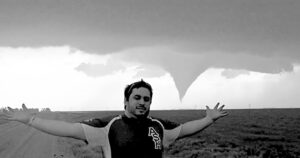
A former firefighter for eight years in his native Evergreen Park, Paxton resident Danny Neal, 37, has been a storm chaser for more than 20 years. “I’ve seen 140- plus tornadoes in my life — all over the United States,” said Neal, who owns IllinoisStormChasers.com. Courtesy of Danny Neal
Storm anxiety. It might be a term you haven’t heard before, but, chances are, you or someone you know has felt it.
Most of us are familiar with anxiety — that uneasy feeling in your stomach, a sudden rush of nerves, or even a full-blown panic attack — but for many, those symptoms start to show up when the skies darken, thunder rolls or the forecast calls for a severe weather. As wild weather approaches, more frequently people are beginning to experience emotional distress tied to the threat of severe storms and don’t have an outlet to express those feelings.
Whether it’s the memory of a past storm or the fear of what might come, storm anxiety is real and more common than you might think.
Local therapist Zachary Devore explains that storm anxiety often stems from a feeling of helplessness.
“When a storm rolls in, we’re reminded that there are things in life we can’t control,” he says. “That lack of control, especially if someone has lived through a damaging storm in the past, can trigger strong emotional reactions.”
Common symptoms of storm anxiety include: asense of dread or panic as weather conditions worsen; physical signs like a racing heart, sweating or upset stomach; constant checking of weather apps or news updates; difficulty sleeping when storms are forecasted; and avoiding outdoor activities during storm season.
For children, these feelings can be even more intense. They may cling to parents, cry more easily or struggle with nightmares after hearing thunder or seeing lightning.
For over a decade, I constantly battled a fear that few around me understood — an overwhelming, paralyzing anxiety triggered by storms. At the time, I didn’t have a name for it. I only knew that even the sight of dark clouds or the mention of bad weather would send me into a spiral of fear. It wasn’t just discomfort; it was a deep, crippling dread that disrupted daily life. I would’ve warranted therapy had my parents known where to turn.
In the mid-1990s, resources and support for storm-related anxiety simply weren’t available in the way they are now. Mental health was still often a quiet topic, and few recognized the very real toll that weather-related fear could take. Today, by sharing this experience, I hope to shed light on storm anxiety and remind others in our community that they are not alone and that help does exist.
For many in Illinois, the sound of distant thunder or the sight of darkening skies is enough to stir unease. For some, that unease can become a serious emotional burden. Recognizing the growing need for support, I have created an online community called “The Storm Anxiety Work Group” — a Facebook group dedicated to helping individuals manage fear and anxiety related to severe weather.
Founded and moderated by me, the group has already connected over 150 members from across Illinois. What began as a simple idea has quickly grown into a trusted, supportive space offering daily weather updates, educational posts, coping strategies and even live Q&A sessions with licensed therapists.
This isn’t just about sharing forecasts; it’s about giving people practical tools to manage their anxiety, understand weather patterns more clearly and know they’re not alone in how they feel.
The group features: real-time weather alerts to help reduce surprises and increase preparedness; fact-based weather education, aimed at demystifying scary-sounding forecasts; live interviews and posts by mental health professionals, offering grounding techniques and expert advice; and a supportive community of people who understand the fear and know how isolating it can be.
This unique, accessible resource is now being offered to residents of Ford County and surrounding communities. Whether you’ve experienced anxiety for years or are just beginning to notice it during storm season, this group is here for you.
To join the Storm Anxiety Work Group, visit: https:// www.facebook.com/followdneal and click “subscribe.”
Danny Neal of Paxton is owner of Illinois Storm
Chasers LLC and deputy coordinator of the Ford
County Emergency Management Agency. He can be reached at dnealweather@outlook.com.


